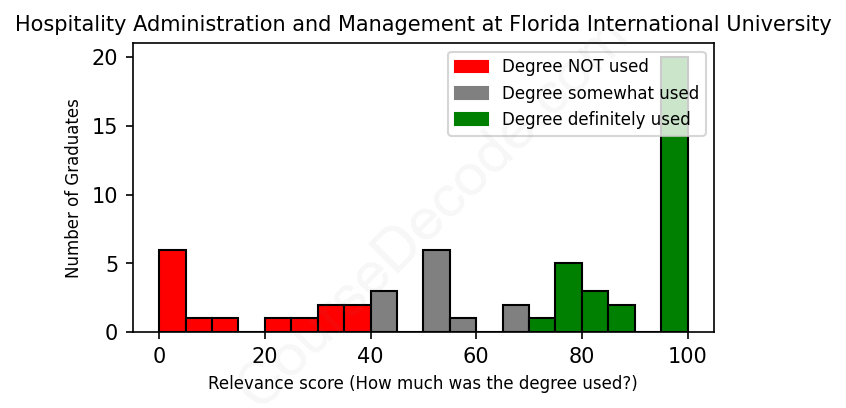
First, some facts. Of the Hospitality Administration and Management graduates from Florida International University we've analyzed , here's how many have used (or NOT used) their degree in their career:

These are estimates based on AI analysis of 57 LinkedIn profiles (see below).
The verdict? Slightly below average. Overall, with an average relevance score of 64%, Hospitality Administration and Management graduates from Florida International University have a slightly lower likelihood (-3%) of finding work in this field compared to the average graduate across all fields:
And for comparison, here's the chart for all profiles we've looked at across all degrees.
Also, after graduating, only 26% of these graduates have pursued further education other than another Bachelor's degree (such as a Masters degree or other), compared to the average across all profiles of 35%. This suggests a Bachelors degree is enough for most Hospitality Administration and Management graduates, and it's normal to look for work straight after graduation.
See the details:
|
Relevance score: 0% We think this person has NOT gone into a career related to their degree. We think this person has NOT gone into a career related to their degree.
DEGREE INFOGraduated in 2020 from Florida International University with a Bachelor's degree in Hospitality Administration and Management. No other secondary education since. JOB HISTORY SINCE GRADUATIONFreelance Freelance Sep 2021 - Present ABOUTNo information provided. |
The top 10 most common jobs done by the graduates we've analyzed (ranked most common to least) are:
When looking at the various jobs held by graduates from Florida International University who specialized in Hospitality Administration and Management, we can see a mix of roles across different sectors. The most prevalent job types seem to fall within hotel and restaurant management, event planning, and customer service positions. Specifically, many graduates have taken on roles such as Front Desk Agents, Restaurant Managers, and Event Coordinators. These positions are directly relevant to their degree, as they require the fundamental knowledge of hospitality management principles, customer service, and operational oversight that students learn throughout their studies.
However, the relevance of the jobs to the degree varies significantly. While many graduates land jobs that align closely with their education—like Banquet Managers, Catering Directors, or Event Specialists—others take paths that are not as directly connected to hospitality management. For instance, positions in areas such as finance, marketing, and even administrative roles tend to utilize only a fraction of the skills learned in hospitality programs. Moreover, some graduates find themselves in roles entirely unrelated to hospitality, such as Legal Interns or Financial Representatives, which don't leverage the core competencies taught in their degree. This indicates a common trend where graduates either secure relevant employment that maximizes their education or diverge into fields that don't necessarily capitalize on their specialized training.
In conclusion, while there is a significant proportion of positions held by graduates from FIU that are relevant to their degree in Hospitality Administration and Management, a noticeable number of individuals continue down career paths that stray from core hospitality principles. This suggests that the flexibility of a hospitality degree allows for various career options, but it also highlights the importance for graduates to seek out relevant opportunities to make the most of their education and training.
Here is a visual representation of the most common words in job titles for Hospitality Administration and Management graduates (this is across all Hospitality Administration and Management graduates we've analyzed, not just those who went to Florida International University):

Graduates from Florida International University (FIU) who have earned a degree in Hospitality Administration and Management seem to follow some interesting career paths, with varying degrees of success in finding jobs relevant to their studies. For many, their first jobs after graduation typically involve entry-level positions within the hospitality sector, like front desk agents, banquet managers, and various roles in restaurants and event planning. These initial jobs align with their education, allowing them to gain experience and get their foot in the door of an industry known for its demanding yet rewarding environment.
As they progress in their careers, typically after about five years, many graduates from FIU are able to move into supervisory or managerial roles. For instance, several graduates transitioned from front desk or service roles to managerial positions at hotels or restaurants, such as becoming event managers, food and beverage supervisors, or even directors of sales and catering. This upward movement indicates that the foundational skills gained during their studies and early jobs have paid off, as many have found themselves in more significant positions within the hospitality sector, often with companies they worked with earlier in their careers. Looking at ten years post-graduation, many alumni are now in higher-level roles, with some even becoming business owners or executives in the industry, demonstrating sustained growth and commitment to their field.
However, it’s not all roses. There are also instances where graduates have ventured off the typical hospitality track into unrelated fields, such as finance, marketing, or even creative roles. While it’s not uncommon for people to explore different career paths, it suggests that not all graduates found their ideal roles in hospitality right away or felt compelled to stay within that sector. Overall, it appears that FIU's program effectively equips students with skills applicable in hospitality while also allowing some flexibility for those who choose to pivot. So, if you’re considering a degree in Hospitality Administration and Management, you’ll likely find good opportunities in the field, especially if you’re open to garnering experience and growing your career gradually!
Honestly, a Bachelor’s degree in Hospitality Administration and Management, whether at Florida International University or elsewhere, tends to be on the more manageable side compared to some other degrees. It mixes theory with hands-on experiences, so while you’ll definitely have to put in the effort, it often involves group projects, presentations, and practical work that can be more engaging than straight-up exams and intensive reading. If you’re someone who enjoys working with people and has an interest in the hospitality industry, you might find it pretty enjoyable and not overly difficult. Of course, like any degree, it can get challenging, especially if you hit tougher subjects like finance or operations, but overall, it’s generally a degree that many students can handle without losing their minds!
Most commonly, in the LinkedIn profiles we've looked at, it takes people 2 years to finish a Bachelor degree in Hospitality Administration and Management.
When you look at the career paths of these Florida International University graduates, it's a mixed bag in terms of how much money they're making. Some have climbed the ranks in hospitality, landing solid positions like "Director of Catering" or "Event Manager" at respectable hotels and resorts. These types of roles often come with decent salaries and can provide a good lifestyle, especially in a business-oriented city like Miami. For example, graduates who have moved into senior management or specialized roles typically see a noticeable bump in pay over time, allowing for a more comfortable financial situation.
On the flip side, many others seem to have started in entry-level positions and remain there for a while before moving up. Jobs like "Front Desk Agent" or "Hostess" might not pay very well initially, which could make it tricky for those graduates to save or invest significantly. While some have eventually transitioned into management or specialized roles that likely pay better, it just shows the importance of patience and gaining experience in the industry. Overall, while some graduates may be making decent money, others might still be working their way up the ladder in a competitive field.
Here is a visual representation of the most common words seen in the "about" section of LinkedIn profiles who have a Bachelor degree in Hospitality Administration and Management (this is across all Hospitality Administration and Management graduates we've analyzed, not just those who went to Florida International University). This may or may not be useful:

Here are all colleges offering a Bachelor degree in Hospitality Administration and Management (ordered by the average relevance score of their Hospitality Administration and Management graduates, best to worst) where we have analyzed at least 10 of their graduates:
| College | Score | Count |
|---|---|---|
 Kendall College Kendall College
|
81 | 12 |
 University of Phoenix University of Phoenix
|
80 | 13 |
 Penn State University Penn State University
|
78 | 16 |
 University of South Carolina University of South Carolina
|
75 | 11 |
 University of North Texas University of North Texas
|
73 | 26 |
 Indiana University of Pennsylvania Indiana University of Pennsylvania
|
71 | 12 |
 University of Central Florida University of Central Florida
|
69 | 40 |
 University of Nevada-Las Vegas University of Nevada-Las Vegas
|
67 | 64 |
 CUNY New York City College of Technology CUNY New York City College of Technology
|
66 | 20 |
 Florida International University Florida International University
|
64 | 57 |
 California State Polytechnic University-Pomona California State Polytechnic University-Pomona
|
64 | 31 |
 University of Central Florida Rosen College of Hospitality Management University of Central Florida Rosen College of Hospitality Management
|
63 | 37 |
 Florida State University Florida State University
|
62 | 29 |
 Missouri State University Missouri State University
|
62 | 15 |
 James Madison University James Madison University
|
60 | 16 |
 Georgia State University Georgia State University
|
58 | 10 |
 State University of New York College at Buffalo State University of New York College at Buffalo
|
58 | 10 |
 The Ohio State University The Ohio State University
|
56 | 14 |
 Johnson & Wales University Johnson & Wales University
|
53 | 14 |
 Monroe College Monroe College
|
53 | 13 |
 East Carolina University East Carolina University
|
51 | 13 |
 University of Missouri-Columbia University of Missouri-Columbia
|
49 | 12 |
 University of South Carolina-Columbia University of South Carolina-Columbia
|
44 | 10 |
 University of Mississippi University of Mississippi
|
43 | 10 |